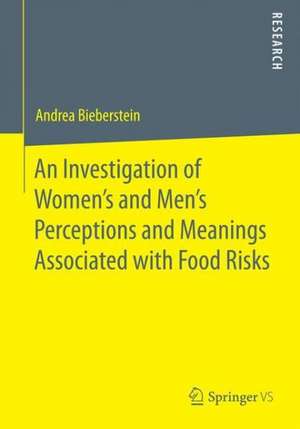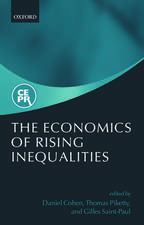An Investigation of Women's and Men’s Perceptions and Meanings Associated with Food Risks
Autor Andrea Biebersteinen Limba Engleză Paperback – 30 aug 2013
Preț: 369.65 lei
Preț vechi: 389.11 lei
-5% Nou
Puncte Express: 554
Preț estimativ în valută:
70.73€ • 74.05$ • 58.53£
70.73€ • 74.05$ • 58.53£
Carte tipărită la comandă
Livrare economică 07-21 aprilie
Preluare comenzi: 021 569.72.76
Specificații
ISBN-13: 9783658032746
ISBN-10: 365803274X
Pagini: 336
Ilustrații: XVI, 317 p. 15 illus.
Dimensiuni: 148 x 210 x 18 mm
Greutate: 0.44 kg
Ediția:2014
Editura: Springer Fachmedien Wiesbaden
Colecția Springer VS
Locul publicării:Wiesbaden, Germany
ISBN-10: 365803274X
Pagini: 336
Ilustrații: XVI, 317 p. 15 illus.
Dimensiuni: 148 x 210 x 18 mm
Greutate: 0.44 kg
Ediția:2014
Editura: Springer Fachmedien Wiesbaden
Colecția Springer VS
Locul publicării:Wiesbaden, Germany
Public țintă
ResearchCuprins
Cognitive and Affective Process in Risk Perception.- Gender Differences in Risk Perception.- Approaches Helping to Uncover Cognitive Structures and Underlying Motivations.
Notă biografică
Dr. Andrea Bieberstein is a postdoctoral researcher at the department of Marketing and Consumer Research at Technische Universität München, Munich, Germany.
Textul de pe ultima copertă
Concern about food risks is widespread. Consumers, however, are found to differ in terms of how they evaluate these risks. One of the most prominent findings in this regard is the differences between women and men. Many studies report that men are less worried about environmental and technological risks than women, which is also the case for food risks. At the same time it is criticized that these differences are often exaggerated, similarities overlooked, and systematic investigations are lacking. Andrea Bieberstein gives a comprehensive overview of theoretical approaches to risk perception and empirical work that has been conducted in the field of risk perception research. Furthermore, she provides a systematic investigation of how food risks are constructed for women and men by uncovering the meanings in terms of associations, feelings, and values that they attach to various food risks. This allows a deeper understanding of the gender differences in risk perception in terms of their relevance and meaning.
Contents
Target Groups
Researchers, students, and practitioners in the fields of risk research and consumer behaviour, with a focus on marketing and cognitive psychology.
Author
Dr. Andrea Bieberstein is a postdoctoral researcher at the department of Marketing and Consumer Research at Technische Universität München, Munich, Germany.
Contents
- Cognitive and Affective Processes in Risk Perception
- Gender Differences in Risk Perception
- Approaches Helping to Uncover Cognitive Structures and Underlying Motivations
Target Groups
Researchers, students, and practitioners in the fields of risk research and consumer behaviour, with a focus on marketing and cognitive psychology.
Author
Dr. Andrea Bieberstein is a postdoctoral researcher at the department of Marketing and Consumer Research at Technische Universität München, Munich, Germany.
Caracteristici
Publication in the field of social sciences Includes supplementary material: sn.pub/extras









